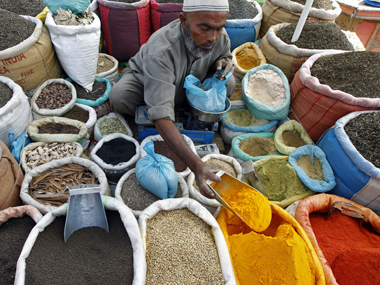The return of food inflation to double-digits - with a huge jump of 1.28 percent to 10.6 percent in the week to 8 October - underlines the abject failure of economic policies under the UPA. The primary failure is fiscal, but monetary policy has not been blameless.
The fiscal policy failure is primary, as government has simply been unwilling to rein in its budget deficit and subsidies, even while doing little to tackle food supplies - especially in pulses, vegetables and milk. Without a supply miracle in these products, food inflation is not going to be licked.
The monetary policy stumble is clear: it is primarily a failure to manage inflationary expectations by evolving a credible monetary stance.
[caption id=“attachment_112787” align=“alignleft” width=“380” caption=“India’s food inflation rose 1.28 percent to 10.6 percent in the week ending 8 October. Reuters”]  [/caption]
The Reserve Bank of India (RBI) under Duvvuri Subbarao made two mistakes: he was too slow to raise interest rates last year to signal a strong anti-inflationary stance; this year, and especially since May, the RBI has sounded more resolute, but it was too late.
Over the last six months, even as Subbarao sounded firm, the government undermined him by talking of rates being too high and indulging in loose talk of inflation-control being just round the corner. This continues to be a pipedream, and inflationary expectations have taken hold in the economy. Both incomes and prices will continue to spiral in this scenario.
Is there a way out?
Actually, no. But there is a way ahead.
We have to let inflation play out by steadily raising rates and wait for slower growth to douse it.
But monetary policy will have to play a secondary role to fiscal - for the primary pressures have to be handled there.
Here’s an out-of-the-box thought, but which is also political dynamite.
No matter whether you raise interest rates or energy prices, the net result will be higher inflation and slower growth. Both are deflationary in nature. Higher taxes are another option to make the budget look better.
Finance ministers prefer the former - and let RBI take the rap for it - rather than raise energy or food prices or taxes, since it saves them the political blushes.
If Pranab Mukherjee were to deregulate diesel prices and reduce the number of subsidised LPG cylinders per family to , say, four per year, prices would go up by around 1 percent shortly.
But on the upside, the fiscal deficit would become manageable, and the external current account deficit would also be trimmed as oil import demand starts falling.
If Mukherjee has the gumption for it, he can also budget for power tariff hikes on the back of higher coal prices, which means inflation would peak sometime next year around 10-12 percent before it starts falling.
Even politically, Mukherjee would be on a stronger wicket if he were to take the fuel price hit this year rather than stagger it over future years. With a general election scheduled for 2014, there is little doubt that by next year the pressure for political giveaways will start growing - whether it is the Food Security Bill or something else, including another farm loan waiver.
The only way Mukherjee will be able to pay for all those freebies is by fixing his budget now. Raising energy prices and reducing subsidies are the only two ways to balance the books. Unless he wants to raise taxes all around.
His predecessor P Chidambaram called for a Buffett tax some time ago. Maybe Mukherjee will have to opt for it in some way.


)
)
)
)
)
)
)
)
)



